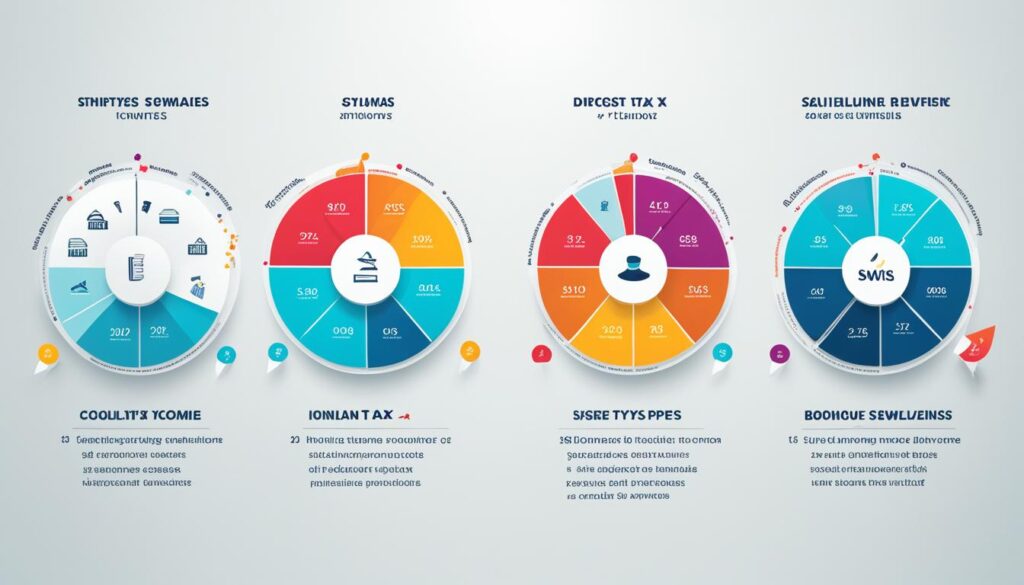Understanding the complexities of taxes in Switzerland can initially seem daunting, especially for expatriates navigating a new financial landscape. This guide aims to simplify the Swiss tax laws by outlining key aspects that affect both residents and non-residents. With a population of approximately 8.7 million and around 18,000 US expats, Switzerland requires clear tax planning to ensure compliance with its unique taxation system.
The Swiss taxation system operates on multiple levels, encompassing federal, cantonal, and municipal taxes. Personal income tax rates can range significantly—from 0% on income up to CHF 18,300 to as high as 11.5% for income exceeding CHF 783,200 for residents. Understanding these nuances is crucial for anyone aiming to effectively manage their tax obligations in the Swiss jurisdiction1.
This article will also touch on the essential elements, including criteria for tax residency, types of income subject to taxation, and available deductions and credits that expats can utilize. For a deeper dive into specific taxes, such as valuable deductions or the implications of the tax treaty between the US and Switzerland, be sure to explore this comprehensive resource.
Key Takeaways
- Switzerland has a three-tiered taxation system affecting federal, cantonal, and municipal taxes.
- Income from employment, investments, and rental properties are all subject to taxation in Switzerland.
- Important deductions and credits are available, particularly for expatriates.
- The criteria for establishing tax residency can significantly affect an individual’s tax obligations.
- There are specific treaties in place that benefit US expats living in Switzerland.
Unlock Investment Opportunities Abroad!
Understanding Tax Residency in Switzerland
Tax residency in Switzerland is a significant aspect of navigating the Swiss tax system. The criteria for establishing tax residency vary for individuals and entities, impacting their tax obligations and filing requirements.
Criteria for Establishing Tax Residency
Individuals are considered tax residents if they maintain a residence in Switzerland or if they stay in the country for more than 30 days while employed2. For EU/EFTA citizens, a residence permit is needed for any stay exceeding 90 days, while non-EU/EFTA citizens can transition to a C-permit after ten years with a valid B-permit3. Non-residents, on the other hand, are only liable for taxes on income sourced from Switzerland, facing limited tax liability2.
Implications of Tax Residency on Worldwide Income
Swiss residents are subject to tax obligations in Switzerland covering their worldwide income, which includes earnings from salaries, investments, and businesses2. This distinction is crucial for expatriates, as non-residents pay taxes solely on their income generated within Switzerland. Therefore, understanding tax filing requirements becomes essential, especially for those with dual tax obligations. The annual tax return deadline typically falls at the end of March for the preceding year2.
Taxes in Switzerland: The Three-Tiered Taxation System

The Swiss taxation system is characterized by a three-tiered framework that includes federal, cantonal, and municipal taxes. This layered approach means that taxpayers need to navigate various tax brackets and regulations specific to their residence. Tax rates in Switzerland are influenced by a combination of federal and cantonal taxes, which can differ significantly from one region to another, impacting the overall tax burden on individuals significantly.
Federal Tax Rates and Regulations
At the federal level, income tax rates are progressive, ranging from 1% to 11.5%. Taxpayers earning less than 13,600 Swiss francs and couples below 27,000 Swiss francs are exempt from federal income taxes. Individual income taxes contribute substantially to the total tax revenue in Switzerland, with further deductions available for specific expenses like social security payments and employment-related costs4.
The federal authorities emphasize economic growth by maintaining lower corporate tax rates compared to other OECD countries, actively fostering a robust environment for businesses5. This strategic tax structure supports capital investments, incentivizing both local and international businesses to set up operations in the country.
Cantonal and Municipal Tax Variations
Beyond federal taxes, the cantonal and municipal levels introduce their tax rates. These can vary widely, with cantons like Obwalden featuring a low 1.8% flat tax, while cities such as Geneva impose rates as high as 17.76% for certain individuals4. This considerable variation in tax structures means that choosing where to reside within Switzerland can dramatically influence an individual’s total tax bill.
Municipal taxes further build on cantonal tax structures and are generally calculated based on taxable income. Collectively, these taxes fund local services and infrastructure, ensuring that residents benefit from their contributions.
| Canton | Flat Tax Rate | Top Income Tax Rate |
|---|---|---|
| Obwalden | 1.8% | Variable |
| Geneva | Variable | 17.76% |
This intricate web of federal, cantonal, and municipal taxes forms the backbone of the Swiss taxation system, shaping the overall financial landscape for both residents and non-residents5.
Income Types Subject to Swiss Taxation

Understanding the different income types in Switzerland is essential for residents and expatriates alike. Switzerland’s tax framework encompasses various categories of income, each subjected to different taxation rules. This section clarifies how employment, self-employment, investment, rental income, and capital gains are treated under Swiss tax law.
Employment and Self-Employment Income
All forms of employment income are taxable in Switzerland, regardless of whether the source originates from within or outside the country. Self-employed individuals must report their business income post-expenses deduction. Notably, shareholders earning directors’ fees face unique tax implications, primarily influenced by their residency status6. Furthermore, expatriates can benefit from certain deductions, which include relocation and commuting costs7.
Unlock Investment Opportunities Abroad!
Investment and Rental Income
Investment income, such as dividends and interest, is subject to taxation in Switzerland. A notable 35% withholding tax (WHT) applies to most dividends for both residents and non-residents, with potential credits against Swiss tax liabilities6. Rental income, generated from properties in Switzerland or abroad, is also taxed at ordinary rates under federal and cantonal regulations8.
Special Treatment of Capital Gains
The Swiss tax system offers a unique approach to capital gains. Currently, private capital gains from the sale of movable assets are mostly tax-exempt unless the seller is classified as a professional securities dealer6. In contrast, gains from the sale of real estate are subject to cantonal capital gains tax, which varies according to holding period and local tax regulations7.
| Income Type | Tax Treatment |
|---|---|
| Employment Income | Taxable at federal and cantonal rates |
| Self-Employment Income | Net profit taxable after expenses |
| Investment Income | Subject to 35% WHT on dividends |
| Rental Income | Taxed at ordinary income rates |
| Capital Gains | Exempt for movable assets; taxable for real estate |
For further details on the Swiss tax environment, insights into official publications like Swiss Tax System Overview provide comprehensive information6.
Swiss Tax Deductions and Credits

Understanding the various Swiss tax deductions available can significantly affect your overall tax liability. Individuals can benefit from multiple deductions for eligible expenses, making tax planning in Switzerland essential for optimizing financial outcomes.
Common Deductions for Individuals
Taxpayers in Switzerland can claim deductions for work-related costs such as commuting expenses and meal expenses incurred at the workplace. Other notable deductions include:
- Healthcare premiums
- Social security contributions
- Charitable contributions to Swiss charities, capped at a percentage of taxable income
- Childcare costs, with limits imposed at the federal and cantonal levels
- Mortgage interest payments and maintenance costs related to self-owned properties
- Contributions to Swiss pension plans, which can yield substantial savings
Taxpayers may also encounter personal allowances based on marital status and dependents, further enhancing the potential for Swiss tax deductions. Recent data shows that allowances per dependent child can range significantly, providing additional relief for families9.
Tax Treaties and Their Benefits for Expats
Understanding tax treaties for expats is crucial, especially for individuals from countries such as the United States. The tax treaty between the US and Switzerland allows expatriates to avoid double taxation on income. Familiarity with these treaties ensures efficient tax planning in Switzerland, which can help maximize savings through allowable deductions and credits.
Effective management of these treaties can provide significant tax relief for expat professionals working in Switzerland.
Conclusion
Navigating taxes in Switzerland requires a comprehensive understanding of various crucial elements. From tax residency implications to the three-tiered taxation system, newcomers must familiarize themselves with how they will be taxed on global income and assets once they establish residency. It’s essential to recognize the diverse tax obligations that can arise, as taxation occurs not only at the federal level but also at the cantonal and municipal levels.
The summary of Swiss taxes reveals that tax planning is key to managing financial responsibilities effectively. For many expats, understanding the nuances of income and capital gains taxes, alongside potential deductions and credits, can significantly reduce their tax burdens. Consulting with a tax advisor to structure assets properly can prevent unexpected double taxation scenarios.
In conclusion, being well-informed about Swiss tax laws and regulations is vital for expats and residents alike. With proper planning and awareness of their rights and obligations, individuals can optimize their contributions to the Swiss economy while achieving personal financial benefits. The journey of navigating taxes in Switzerland becomes much smoother with the right information at hand, allowing everyone to focus more on the many benefits of living in this unique country1011.
Unlock Investment Opportunities Abroad!
FAQ
What determines tax residency in Switzerland?
How does tax residency affect my worldwide income?
What are the federal tax rates in Switzerland?
Are there variations in tax rates across cantons?
What types of income are subject to Swiss taxation?
Are capital gains from asset sales taxed in Switzerland?
What common deductions can individuals claim in Switzerland?
How do tax treaties assist expatriates in Switzerland?
Source Links
- https://www.greenbacktaxservices.com/country-guide/taxes-in-switzerland-americans-abroad/
- https://myjourney.packimpex.com/en/guides/taxation-switzerland/
- https://www.taxolution.ch/swiss-tax-guide/tax-residence-part1/
- https://en.wikipedia.org/wiki/Taxation_in_Switzerland
- https://taxfoundation.org/location/switzerland/
- https://taxsummaries.pwc.com/switzerland/individual/income-determination
- https://www.mme.ch/en/magazine/articles/overview-of-individual-taxation-in-switzerland
- https://www.henleyglobal.com/newsroom/industry-insights/taxation-swiss-residents
- https://taxsummaries.pwc.com/switzerland/individual/deductions
- https://link.springer.com/chapter/10.1007/978-3-031-23194-0_12
- https://www.irs.gov/pub/irs-trty/swiss.pdf

Comments